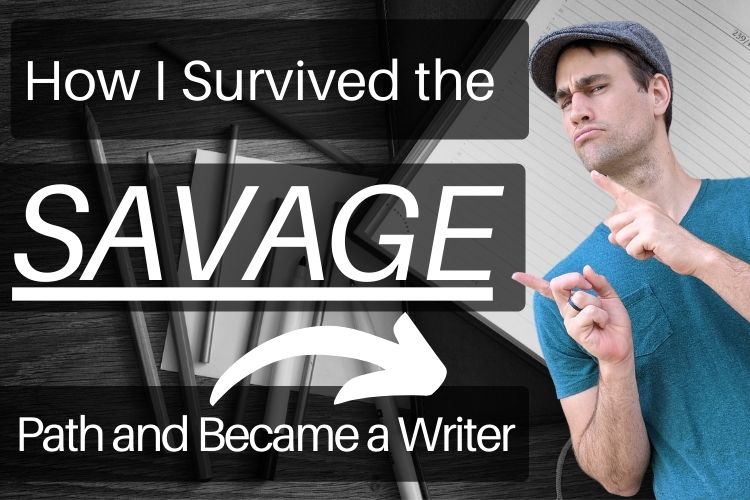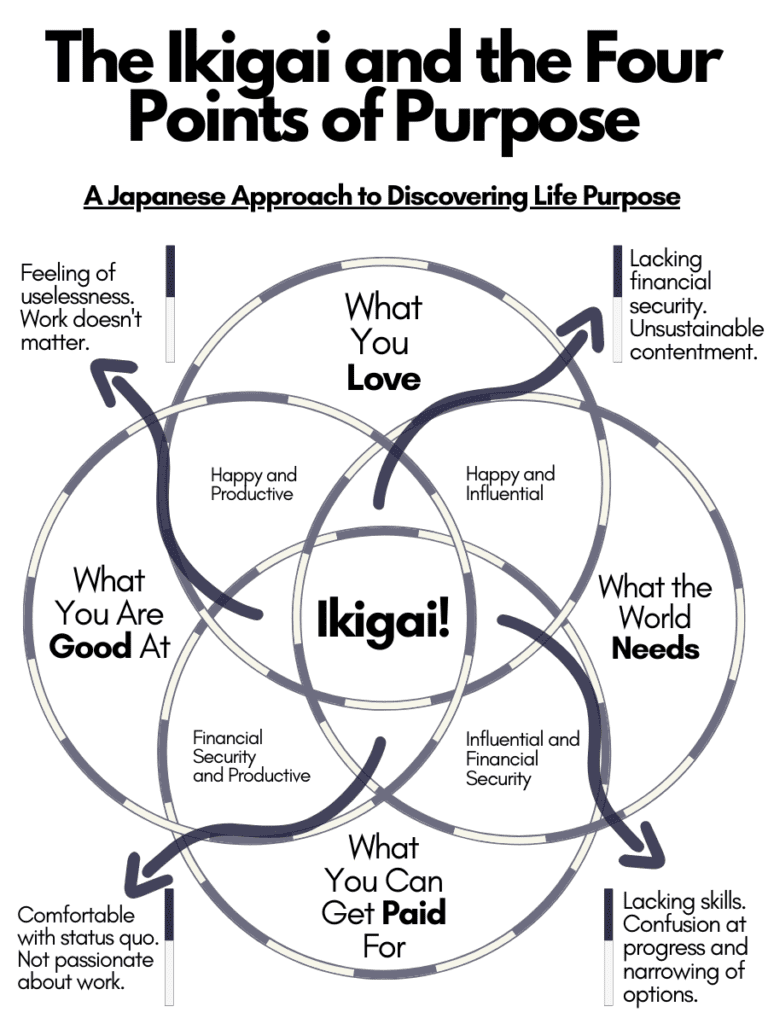It’s not the chicken or the egg. It’s both. I became a writer the day I decided I was a writer.
In the next 3 minutes and 43 seconds, I’ll share my story of becoming a writer, divulge the secret magic of the Ikigai, and encourage you to inject a booster shot of purpose into your life.
You with me?
I’ve never told this story online. Unless our Google Home hears everything I say (I don’t believe this, but the jury’s still out) only a few close friends know how I survived the savage path of becoming a writer.
One such close friend, who hails from Germany, asked me recently about what I do for work. He and another German friend are fantastic at asking questions, so I was ready with a detailed response. I passionately told him about authoring and ghostwriting and how it feels like a perfect fit.
He responded simply with, “It’s really cool that you’ve found your thing. Most people don’t ever find it.”
His thoughts inspired two polarizing emotions:
- I felt happy and proud that I had found my one thing.
- I felt confused and sad that there are many people who never find theirs.
85% of all people are unengaged and unsatisfied with their jobs. Loving what you do for work is rare, but should it be? (I think that if everyone did work they absolutely loved, the world would be a far better place… But I don’t have the data to back up this hunch.)
Regardless, we owe it to ourselves to kill the monster that is complacency. It wants to gobble us up and never let us go.
I fought back that monster when I was twenty-five. Here’s what I did to not only become a writer, but finally figure out what the heck it is I wanted to do with my life:
- I took action and failed. A lot… I’ve written more garbage than I want to admit. There is no better avenue towards quick learning than action. I had no business writing my first book, but no one really does. The path was savage, but I battled through.
- I grew in self-awareness and gained confidence in my personality and strengths. (This is why I am such a huge proponent of tools like the CliftonStrengths and the MBTI).
- I believed I could be more than I was. This sounds cliché, but it’s impossible to strive for more if you don’t believe you can. It starts with a small ember of a belief in what’s possible, which is then flamed into life change.
- I charged for my work. I didn’t wait for the stars to align to begin.
- I took feedback, ignored the trolls, and acted on advice from mentors.
- I showed up and put words on the page over and over again.
My journey isn’t all that unique, but it is. What I had to go through, overcome, accomplish, and admit to myself was entirely specific to me. This is the case for anyone seeking purpose. It’s never easy, but you don’t want it to be, anyway.
Is Your Life 100% as Amazing as it Should Be?
I wrote my first book in 2015 while working a demanding job. It launched with the applause of only a few. Now I get paid to live out my dream every single day. One day I will be a NY Times bestselling author. It’s not just confidence, it’s looking ahead and acting with intentionality.
Most jobs are stepping stones for eventually finding the work that you love. If your Ikigai (your reason for being), isn’t emerging in a splash of color every time you start work for the day, your current job/career/skill/freelance/business is just a next step.
I like to think this is okay. Wherever you find yourself today is great. Be proud of how far you’ve come, but don’t stop.
Writing became the one constant, the one task I was always excited to get lost in. Maybe there is something that always comes back and is always present in your life? Don’t ignore the magnet-like pull of the thing that brings you the most joy.
I didn’t know it at the time, but I was seeking my Ikigai. I was looking for something that was my “purpose” but also enthralled my heart, gave back to others, paid the pesky student loan bills, AND was something I was good at.
The best way to live out and/or seek purpose, contentment, and fulfillment is one slight change at a time. Look at your life from above and without: identify the cracks, analyze the common roadblocks, and then change your circumstances.
This is what the Ikigai looks like (image credit my own, first appearing in my book, Catalyze Your Destiny):
The Ikigai (or the four points of purpose) breaks down into:
- What you love to do
- What the world needs
- What you can get paid for
- What you’re good at
Does your current work (or what you spend most of your time doing) answer “YES!” to the four points of purpose?
- Am I deeply passionate about what I do?
- Does my day-to-day work give back in meaningful and lasting ways?
- Do I get paid enough for what I do? (and never forget: You get to define “enough.”)
- Am I good enough at what I do that I can hit a flow state? Do I feel I’m growing and improving?
Lack even one “yes,” and some form of burnout is just around the corner.
Writing, for me, checks all the boxes of the Ikigai. Finally, through years of hard work and perseverance, I made it here, and I’ll fight to stay.
I wasn’t lucky. I fought for this. I say this with pride, with my head held high. I didn’t just survive the painful journey of writing; I crushed it.
The myth that writers (or any career path, art form, or skill) “can’t make money” or “can’t be successful so you might as well quit,” is a limiting belief. You can make money doing just about anything if you are creative, passionate, dedicated, and possess an iron will to succeed.
We all have the potential to live out our purpose right now, even if that purpose is recklessly pursuing growth and change. I know of no better advice than to put your walking shoes on and get your butt out the metaphorical door. If you thought you were in the sweet spot but didn’t match each of the four points, a minor change might be the ticket to greener pastures.
Joy comes from the journey itself. If we stop growing and stop seeking, we will fade. There is no such thing as neutral momentum in life. We are growing forward or failing backwards.
Ask, “What would I do if I could do anything?” and your world will open up before you.
But before we go any further, can I be honest for a second?
I don’t like every aspect of being a writer. Far from it! It doesn’t have the chilled vibes of playing corn hole with a beer in hand. In fact, there are some days when it’s brain-numbingly painful to open up a blank Google doc.
But the beauty comes when I get lost in the pages. Of time zipping by untethered. When I get so lost in the flow that I lose myself. This is living the moment. This is pure joy. This is why I write.
“There is no rule on how to write. Sometimes it comes easily and perfectly: sometimes it’s like drilling rock and then blasting it out with charges.” —Ernest Hemingway
So what would I do if I could do anything? I guess it’s only fair that I answer my question too…
I would sit at my computer and let the thoughts flow out. I’d also play padel ball, Halo Infinite, read, drink coffee, spend time with my wife, eat sushi and Stromboli (not together, ick), go for long walks while listening to the latest sci-fi novel, etc.
But for work, I truly feel as if writing meets all the points on the Ikigai, something I can enjoy doing while also giving back in meaningful ways.
So, I’m a writer.
What are you?
Enjoy the Painful Drudgery While Working Toward Awesomeness
Beware of Destination Addiction – a preoccupation with the idea that happiness is in the next place, the next job and with the next partner. Until you give up the idea that happiness is somewhere else, it will never be where you are. —Robert Holden, Ph. D.
The above is true. For now.
It’s not all about growth and change. The tough lessons of life drilled this into me repeatedly until it finally stuck. The present moment is more than enough. Soak it in.
I learned to deal with my current lot in life. When it was vacuuming after meals because a server quit, I did it with a smile. When it was making cold calls for hours every day to fill the building, I begrudgingly got through it. When I had to wash dishes for two weeks straight, I stained several ties, but made it out okay.
How do you reach for more yet still be okay with how things are right now? It’s a hard line to tread. I don’t have a great answer for you.
The destination is likely better than your current predicament. Happiness is where you are, but things likely can be much better. The belief that you are currently at your best is unhelpful (and even dangerous!). Complacency rides on the backs of settling for just “okay.” Okay is fine for right now, but not forever.
Work towards your goals a bit every day. Even if the step is super small (writing 100 words, sending an application, learning a new skill) you’re making progress, and progress is the antidote to passive living.
Life might be painful or just plain annoying right now. But it’s only for right now. This too shall pass, as long as you are making progress.
-Jordan
—–
👍 Let me know how I can be a part of your story: jordan@jmring.com
👍 Catalyze your destiny (i.e.: get ready to do some tough work): https://www.Jmring.Com/catalyze-your-destiny/
👍 Unlock personality secrets and finally understand yourself and others: https://www.Jmring.Com/school-of-you/
👍 Hire Jordan to write your book: https://jmring.Com/jordan-upwork-profile/
👍 All links: https://linktr.Ee/authorjmring



Very interesting
Thank you for reading!
I love all your words!
Frank comments, “Excellent thoughts, well organized, passionately written. People need to read this, and see how it might speak to them. You always make me think and consider action to take. Thank you Jordan.”
Thank you Frank! So glad you stopped by. 🙂
I’m glad to hear that from you, your words strengthen my faith in my day to day activities, thanks Jordan…! 🙏